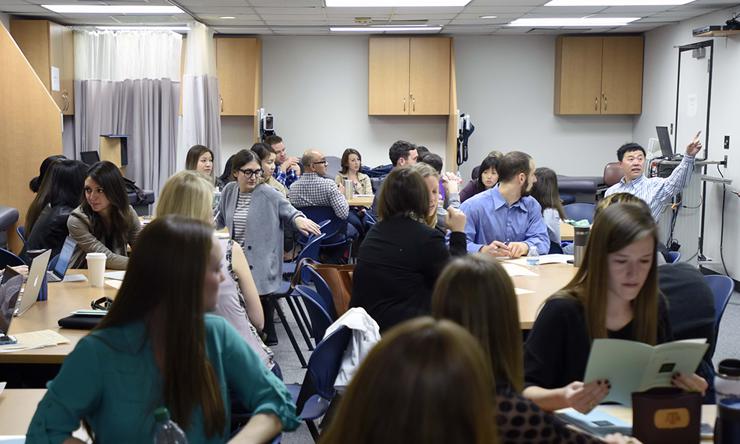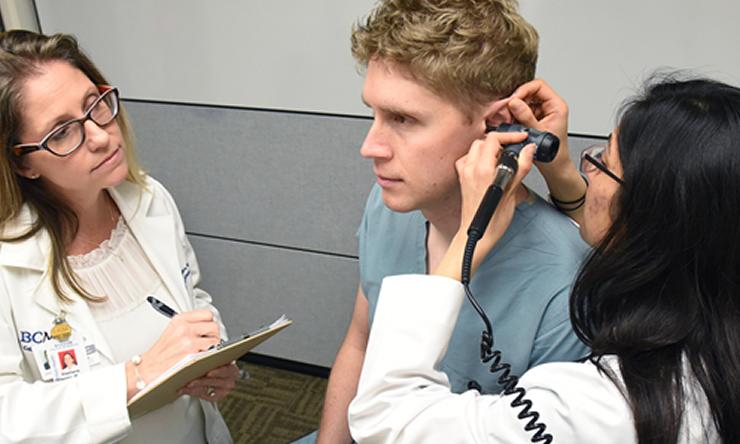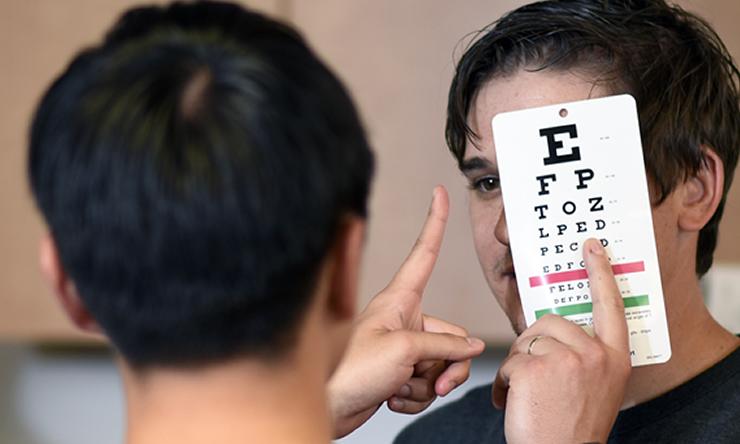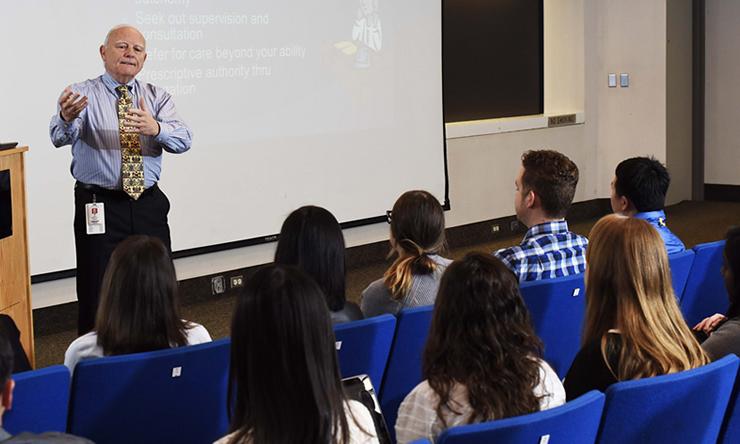
Peers and Teachers
Your fellow students will not only be your colleagues, they will also be among your best teachers. The diverse perspectives brought by your fellow students will enrich every aspect of your training.

Hands-On Learning
Working with standardized patients in Baylor’s Simulation Program for Clinical Performance Improvement, PA students practice and receive feedback on their history taking, examination, and counseling skills.

Interdisciplinary Learning
PA students and medical students learn side-by-side, sharing the same facilities and training at many of the same clinical sites.

To Become the Best – Learn From the Best
Our faculty members are national leaders in their profession. They prioritize sharing their expertise and knowledge with the next generation.
Our challenging course of study is designed to prepare students from a variety of educational backgrounds for their future roles in the PA profession as clinicians, educators, researchers, policy experts and patient advocates. The innovative 30-month curriculum (135 semester credit hours) goes beyond the competencies essential to the provision of high-quality patient care to ensure our students achieve mastery of:
- Administrative sciences essential to the organizational, informational and financial underpinnings of clinical practice
- Knowledge and skills required for practice-based learning and continuous improvement gained through coursework and experiential research opportunities
- Interdisciplinary teamwork skills necessary to work as a part of the healthcare team
- Epidemiological approach to understanding health and disease in human populations
- Differential diagnosis as a skill fundamental to the assessment, diagnosis and treatment of illness and injury
- Motivational interviewing and behavioral counseling skills to identify and modify lifestyle practices that place persons at greater risk of illness
- The latest advances in molecular biology, genetics, immunology, information sciences, and diagnostic technologies
- The economics of medical care along with the ethical policies surrounding the provision of care
Lifestyle Medicine

Lifestyle Medicine is the therapeutic use of lifestyle change in patient care to prevent and treat disease. Recognition of the importance of lifestyle has led to an evolution in our curriculum. We include modules in nutrition, physical activity, mental well-being and behavior change. Students learn how lifestyle can prevent or cause disease, how to gather a prevention and lifestyle history, how to apply skills related to nutrition assessment and counseling and about stress management and self-care. Together, these elements of our curriculum help shift the focus from disease to health promotion.
Sarah Keyes, a certified lifestyle medicine professional at Baylor College of Medicine, discussed Lifestyle Medicine in a post on the BCM Momentum blog. Read the article.
We frequently share news related to Lifestyle Medicine on our Facebook page. Follow us to stay up-to-date on the latest developments in the field.
"Medical professionals are starting to realize that prevention is a treatment and work is increasing to help patients discover their own motivations for their health. The Lifestyle Medicine class in the PA program is on the cutting-edge of this trend."
Enrichment Pathways
Physician assistant students also have the option to pursue specialized interests through enrichment pathways offered in collaboration with the School of Medicine. Pathways open to PA students include medical ethics and the Diploma in Tropical Medicine portion of the global health pathway, with participating PA students earning a Diploma in Tropical Medicine through the Baylor College of Medicine National School of Tropical Medicine.
Medical Ethics Pathway
The Center for Medical Ethics and Health Policy offers the Medical Ethics Pathway for medical and physician assistant students seeking to develop greater knowledge and expertise in medical ethics. The Medical Ethics Pathway is comprised of the first-year foundational course in Medical Ethics where students learn to use the Ethics Work-up followed by the Bioethics seminar where students develop a greater understanding of the philosophical, historical, legal and religious underpinnings of bioethical debates.
An introduction to medical ethics in the clinical setting is explored in case-based seminars. Faculty then assist students design, implement, evaluate and disseminate the results of a scholarly project in clinical ethics. Students who complete the pathway are presented a certificate during the Baylor Medical Ethics Pathway graduation and receive a Certificate in Biomedical Ethics at the time of graduation.
Tropical Medicine
The Diploma Course in Tropical Medicine offered by the Baylor's National School of Tropical Medicine is designed to prepare medical and physician assistant students with the knowledge and skills to diagnose and treat tropical infectious diseases as well as the confidence to care for patients at risk for these diseases in communities around the globe.
The curriculum is comprised of four modules: Epidemiology, Public Health and Health Systems; Tropical Bacteriology re/emerging diseases; Neglected Tropical Diseases: Parasitology, and the Clinical Applications of Tropical Medicine Abroad. Faculty assist students design, implement, evaluate and disseminate the results of a scholarly project in tropical medicine. Students who complete the pathway are presented a Diploma in Tropical Medicine at the time of graduation.
Curriculum Structure
The 30-month curriculum of the PA Program is divided into a two-semester 13-month didactic and a three semester 17-month clinical phase of instruction. The longitudinal Master’s Paper Project experience is comprised of five required learning activities that begin mid-way during the didactic phase of the curriculum and end just days prior to graduation.
Leveraging Technology
The Anatomage table and software enhance the anatomy learning process for all our students.








